Digger talks to
Steve Warner who runs autograph business autographcollection.co.uk
about the fascinating world of autograph collecting. Steve has a lot
of advice for novice collectors to get the most from their hobby.
For investors in these uncertain financial times, Steve also
suggests that autographs and signed collectables are more sound an
investment than stocks and shares.
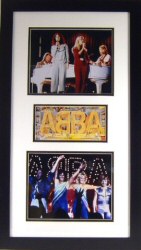
Abba
Digger:
Hello Steve. Hope you're well?
Steve: Hello David. Iím fine and Iím glad you could tell the time
today!
Digger: (Laughs) Rub it in because I thought 14:00 was 4 oí clock
yesterday and we missed each other! Iím 52 now and I get at least one senior moment a day.
Steve: (Laughs) A bit premature to be senile?
Digger: Possibly, but I can remember very small pieces of trivia from the
60s and 70s but not what I had for breakfast, or, indeed, if I have
even had breakfast. Thatís a joke by the way! But the short term
memory does tend to go a bit. Have you had that 'blokey' thing where
you canít see things in front of you in a cupboard or fridge and
you have to get help?
Steve: No.
Digger: Youíve got that to look forward to as well. (Both laugh) I was
in the Co-op a while ago and there was a man in front of me at
the bakerís counter and I knew he was thinking the same as me.
ďWhere are the bags for the rolls?Ē And he spent two minutes
standing there, eyeing the shelves up and down and so did I. He then
asked an assistant who showed him they were right in front of him
(and me.)
Steve: One of the things is, because I work from home and my wife
goes out to work, I end up doing all the housework and the weekly
shop and everything.
Digger: Either itís an age thing or thereís something wrong with me.
(Both laugh) Iíll do the shopping with my partner and yesterday
she said ďThat packet of fruit you bought has gone over.Ē It had
fermented. And I didnít remember buying it and I couldnít see it
in the fridge until she pointed it out. (Both laugh) Silly old fool.
Steve: Your mind is obviously crammed with other stuff.
Digger: Thatís it. I donít forget important stuff normally. (Both
laugh)
Steve: To be honest, I gave up on you yesterday at 2:45 as I had to
go out.
Digger: I thought that was the case. Sorry. Itís not good, but we all mistakes
and Iím not going to beat myself up about it. But thanks for
reminding me. (Both laugh)
Steve: Youíre probably going to ask me lots of nasty questions now
we started off on the wrong foot?
Digger: Not at all! How did you get into the autographs business?
Steve: I worked in the book trade for about fifteen years in
bookselling and book wholesaling. From the shop floor up to director
level in quite big companies. It got to the stage where Iíd had
enough of that.
Digger: What was it you hated?
Steve: A new managing director who came in and was basically getting
rid of all of the people the previous MD had employed. He was
just the nastiest little man you could ever come across. He didnít
give a damn about anybody or anything. And in the end, after putting
up with it for a few months, I went in on the first day back after
the Christmas break and told him where to shove it.
Digger: Excellent. Did you have any backup?
Steve: Nothing at all!
Digger: (Both laugh) Wow, that was very brave!
Steve: Also, I didnít want to work in London and that was where
most of the big book publishers were. I lived in the country and
wanted to stay here and work here. Iíd got used to the quieter
pace. Iíd collected autographs in terms of signed first
editions through working in the book trade and had often been to celebrity
functions but didnít ever ask people for autographs at all. I
played snooker with Ronnie OíSullivan one night and had dinner
with John Major and Terry
Pratchett. And yet I never asked for autographs. I did collect
vintage Hollywood autographs. So it was a case of what would I like
to do? Eventually I thought about setting up my own business and
because I had a good retail background Ė buying, marketing, then
that's the kind of thing I wanted to get into. So when I started up
it was a case of investing in some stock. And, this was five years
ago. I was pretty much focused on antique collector's fairs and
going round the country almost every week to different locations and
taking the stock with me. Anybody whoís done that will tell you
itís incredibly hard work and the rewards are pretty uncertain. It was hard work gradually building up
the interest and the contacts. Because Iíd had the retail
skills I could display the items well and was good at dealing with
people. So, gradually, I built up a customer base.
Digger: How do you work out your pricing?
Steve: As with any collectable, pricing is a case of looking at how
much you spent and then how much you want to make on top. And you
can be as generous or greedy as you like but youíre not going to sell it if you get too
greedy in the first place. I never price anything until itís
framed or mounted and is the finished article. If I go and buy a
signature on a signed album page, I donít have a specific price in mind
apart from a general idea.
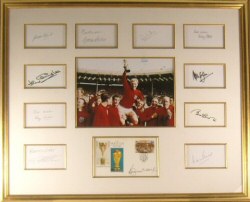
World Cup Squad 1966
Digger: The World Cup item you have Ė is that everybody from the 1966
team?
Steve: That is the eleven players who played in the final. Because of
the nature of the framing itís a high-quality piece. Also
because this is a World Cup year thereís going to be increased
interest.
Digger: How much do you think thatís going to go for?
Steve: Iíve got it at £825. I may not get as much as that
because, on the Internet, just as at a fair, people do barter and
theyíve got used to doing that. They donít just see a price and pay
it, they ring up or email me and ask me what price I can do it for. So
you donít necessarily get what you see on the screen. I often
discount for regular customers as well as a sort of loyalty scheme.
Digger: Do you do 'layaway'?
Steve: I do that for certain customers and Iím happy to put an item
to one side and the customer gets the item when itís paid for.
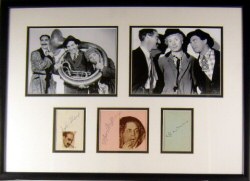
The Marx Bros
Digger: Iíve got a rare signed photograph 'pairing' here. Ian Hislop and Robert
Maxwell in my album from the 80s, when Maxwell was taking Private
Eye to court on a regular basis. It appealed to my warped sense of
humour to write off to both of them and then to have their photos in
the book on opposite sides of the album so that they were face to
face when itís closed! This was before Ian was a household name
from the news quiz and the photo he sent was an eccentric close-up
which I told him scared my baby. I got a letter from Maxwellís
office which I had to return to them signed saying that I wouldnít
use the photo for publication.
Steve: It sounds like a nice piece but probably not worth a lot.
Digger: I donít think Maxwell got many requests for autographs. He fell
off his yacht about a year later.
Steve: Often artists do have disclaimers like that with their signed
photos.
Digger: One TV star I interviewed, an elderly gentleman, was having a
hard time because an autograph dealer was turning up with a suitcase
every so often on his doorstep almost demanding that he sign a lot
of items. This star was getting on a bit and it was quite upsetting
for him really.
Steve: I think thatís got worse these days. I never stand outside a
stage door. Iíve never waited outside a sports arena. I think
itís got worse because of eBay and there are some bad-mannered and
unscrupulous people out there. I donít operate like that. I
acquire all my stock from known dealers and specialist auction
houses.
At a lot
of these pro-celebrity golf tournaments they end up being besieged
and canít even play a shot. To the point where someone who is
quite mild-mannered or generous loses it. And I think in certain
areas it has become quite a problem but my business isnít like
that.
Digger:
You were talking about how you set up the business...
Steve:
So, when I was doing the fairs I gradually built up and then
the recession came along at the end of 2008 and the fairs market
fell apart. And theyíre expensive events to do.
Digger: And tiring and time-consuming.
Steve: When you get to the stage where youíre basically giving away a
large amount of stock and you come back with no profit and all
itís done is pay for an agricultural shed and a cheap hotel for
the weekend, itís not a great reward.
Digger: But online business has obviously held up?
Steve: What I did was at the beginning of 2009 I decided to not do
the fairs for a period of time and the online has just grown so
significantly in that period that since then Iíve only done two
fairs. And they were two where there were guaranteed good sales. So
my initial plan was to put the fairs on the back burner for a few
months while people were dealing with the recession. This became
a decision that it was actually far better to focus on the website,
also as a lifestyle choice. My overheads are less and when money
comes in I can reinvest it in stock. So my stock range has increased
considerably and that generates more sales. Itís the nature of
autographs Ė thereís an endless sea of them out there. Because
people want such a variety, if youíve got a broad stockholding and
if your money isnít blown away on petrol and hotels, and if you
buy the right things, your sales go up.
Digger: Youíre doing alright in a recession so, as the say, if you can
start up and do okay in a recession then youíre bound to succeed
and be bullet-proof when the upturn occurs, if it isnít already.
Steve: There were certain things last year like the drop in fairs,
then I had a big website redesign and that had quite a significant
impact on sales as well. And then Michael Jackson died and this just
brought a whole new raft of people looking at the website.
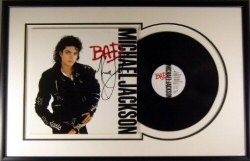
Michael Jackson
Digger: Another conspiracy theory in my mind now! (Both laugh) All the
autograph dealers got togetherÖ
Steve: What weíve go to do is work out who itís going to be this
year!
Digger: What advice would you give to somebody starting to collect
autographs?
Steve: A couple of things. As with any collectables, buy what you
like and buy what youíre interested in. Autographs are great in
that they give you that link to somebody. Everybodyís got their
hero be it in film, an author, a sportsman or whatever. Somebody whoís done
something in the course of history that they admire. Whatever
interest or taste they have, autographs can provide that close link
and it is interesting and a lot of people say ďI donít
collect autographs but Iíve got some.Ē And thereís very few
people who say they donít have one at all. Most people have got an
autograph, whether it be one they obtained in person, that they
bought or were given or inherited. So if people start to get more
of an interest and want to collect them I think the biggest thing is
donít rush out and start buying. Educate yourself and get to know
the market. Get to know the pitfalls and get to understand that
itís estimated that 95% autographs on eBay are forgeries. Be aware
that there are rogues out there who have been ripping people off for
a long time.
Digger: Have eBay attempted to do anything about it?
Steve: They try from time to time. They have worked recently with a
premiership footballer to try to expose and identify some dealers
who were dealing in fake signed football shirts. They had a phase of
clearing them off.
Digger: But then they turn up the next day as a different user.
Steve: They had a systematic campaign but eventually eBay get bored
and things go back as they were. Itís one of the reasons I donít
sell, and havenít for over four years, on eBay. I donít want to
be associated with that market. A lot of dealers will sell on their
websites and eBay. Itís not for me. There are some reputable
dealers on there but plenty of forgeries. I might be able to
identify forgeries and most dealers would, but your average novice
customer would not.
Digger: Should they look for the UACC mark?
Steve: In terms of educating yourself, thatís one of the things.
Itís getting to know the market and who the good sellers are. The
Universal Autograph Collectorís Club is an American organisation
and anybody can be a member of that and it doesnít signify that
theyíre a good trustworthy dealer. They do run a registered dealer
programme where you have to have proven that you are known by
others, youíve got to show your experience and your knowledge and
to prove your sources. In the UK thereís a younger organisation
which has been around for a couple of years, but which is having more
of an impact called AFTAL. The Autograph Fair Trade Association - this is a
group of professional dealers and you can only become an approved
dealer if they can verify your credentials. In fact, they come to
inspect peopleís stock from time to time. They also work closely
with trading standards. So if youíre looking for dealers you can
trust, and thatís the important thing, getting a relationship with
established dealers, then a starting point is to go to a UACC or
AFTAL- registered/approved dealer. Both of their websites have
lists of such approved dealers. Then get to talk to those dealers,
whether itís asking their advice, asking about a particular item
they have for sale. And one of the things Iím always happy to
provide is advice or information for customers. What I donít do is
valuations, because they are time-consuming and I would get
inundated with such requests. There are companies that do valuations
and they charge a fee. Most people, when given the value, will then
sit on the item or not even believe the valuation they have been
given and want more for it. Very often the enquiry is because they
have something in their drawer or they just bought it and they want
to check the value.
Digger: Do you buy from
dealers and the public?
Steve: I do not buy from private individuals but only from
approved and known dealers Ė then you are offered items from a source
you know rather than from a source you have no idea of and cannot be
sure of the origin and authenticity of the item. There are always
far more items that Iíd like to buy than I can afford, so I prefer
to obtain my stock from reliable sources. The idea of getting an
item from a complete stranger for an inflated price is not
appealing! Also to understand about price, I would suggest if you see
a John Wayne for £30 or a Marilyn Monroe for £50 then the old
saying ďIf it looks too good to be true then it probably isĒ remains true. And, likewise, be careful of quite big companies who
excessively price things. A lot of people buy their first autograph
when they go to Florida or Las Vegas and they get caught in these
tourist shops and come back with something at unbelievable prices
which they could have bought over here for a fraction. So itís all
about educating yourself. Because I want people to do that and other
dealers want people to do that. If somebody who is interested in
starting up a collection gets their fingers burned then theyíll
probably turn away and buy something else altogether.
Digger: I suppose there are only so many collectors?
Steve: There are, but an awful lot of my sales are actually one-off
purchases which are Christmas, anniversary, birthday, retirement
presents. Everyone has got someone they admire.
Digger: I once thought that Iíd never buy any autographs. I used to
write to a lot of up-and-coming stars in the 80s and 90s Ė
comedians like Rowan Atkinson, Victoria Wood, Paul Merton, Rik
Mayall, Harry Enfield, Stephen Fry. We even used to swap a few
postcards or letters. I was a big collector of Janet Leigh
memorabilia and she signed a lot of items and photos for me. But
then I also started to buy signed Janet Leigh items that I didnít
have. I must have the biggest Janet Leigh collection in the world.
But because she was so generous and prolific with her signing, they
probably arenít worth much. And I suppose because the comedy
people and others are relatively easy to find the same applies.
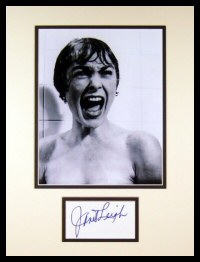
Janet Leigh
Steve: It comes back to either collecting what you like or deciding to go
for investments. Autographs are good investments and increasingly
Iíve got a number of customers who are tired of traditional
investments and putting their money in the bank.
Digger: Thatís good news. I head heard about this, even just the other
day from a client who sells car mascots, but itís good to hear
itís true in your arena too. He said you might as well paper your
walls with £5 notes or use them more productively in solid
investments of memorabilia.
Steve: Increasingly people are doing that. As long as they are
buying the right thing. If youíre looking for an investment,
donít go for current premiership footballers or current film and
pop stars. Look at those people that have got an enduring
popularity. People who collected autographs in the sixties Ė there
will be a lot of names most people today havenít heard of but
there will be a few that everyone, even the youngsters today, will
be aware of. Itís those sorts of people that you should collect
from any period and any genre.
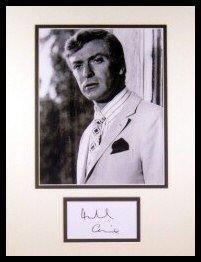
Michael Caine
In the States two
weeks ago they sold a Jimi Hendrix Experience item, signed by all
three. It was just an album page and it went for $5,000. It was the
auction price but an incredible amount of money for a piece of paper
that was signed in 2 seconds not that long ago. When album pages
with all The Beatles are selling for £3,000 - £5,000 and signed
photos at £8,000 - £10,000 and Marilyn Monroe photos now selling
at £10,000 - £15,000. People with an enduring popularity are the
best investments. Yes, you can buy your favourite football or pop
star and so on, and I sell plenty of those. But a lot of people will
look back to an earlier period in their lives, maybe teens or early
twenties, and the people they admired then, now some thirty or forty
years on, who they still admire. Theyíre the people they collect and
theyíre the best bet from a value and investment point of view. I
do particularly well with heavyweight boxers from the 20s, 30s and
40s, when I can get them. Iíve got a number of collectors who, if
I put them on the website, they donít last very long. Whereas
contemporary boxers Ė there are some people who are collectable. I
buy autographs every day but I never buy something because I like it
I always buy because I think I can sell it on.
Digger: What about Henry Cooper?
Steve: Another one who signs lots every day. Not big value, but nice
to have if you like him.
Digger: Whatís the best aspects of running Autograph Collection?
Steve: All the benefits of being able to run your own business.
Independence, unpredictability. I like the idea that I donít know
in the morning what the day will bring.
Digger: Running your own business is not like being a salaried person.
Steve: I do think when youíre running your own business and itís
still in the relatively early stages and youíre building sales, you
are aware that it can drop off for any reason. Thereís a general
election coming up and it could be that, during the course of the
election, people will be tighter with their spending. Iíve seen
this happen with the book trade and then after the election theyíre
more free with their spending. Iíve only got a small range of
politicians for sale and some not even on the website because I
havenít worked out what to do with them. Margaret Thatcher is a
regular-seller. I donít like the woman and thereís nothing about
her that I admire, but I donít mind dealing with her signature.
Digger: The Brigitte Bardot signature is a very complicated one.
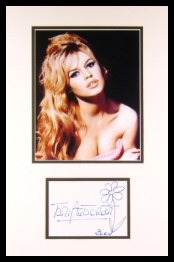
Brigitte Bardot
Steve: Yes, sheís been doing that for so long. You only have to
donate to one of her charities and sheís happy to sign. The
problem I have with modern stars is that often itís just an
unintelligible squiggle and each time they sign it can be different.
Thereís no uniformity to it.
Digger: Itís good if you get a bit more, like Tippi Hedren always draws
some birds with her signature.
Steve: Yes, there are some nice features. Itís one of the reasons
why, when I was collecting myself, I went for vintage Hollywood. Because if itís in fountain pen or pencil then theyíre clear and
readable and with the advent of felt tip people seem to
have become less so. Another two nice aspects of the business - when
purchasing the items I might only own them for a short time but they
pass through my ownership. Itís nice to own them for a while and
itís also nice to look at what I might replace them with. When you
get certain items coming through itís a pleasure having them, even
briefly. The other thing that may be a surprise - a nice thing about
running the Internet business is how pleasant so many of my
customers are. The Ďfeedbackí, a word I donít like because
itís a eBay thing and exploited in so many ways, but the comments I
get back Ė nice emails which are spontaneous. I donít put
testimonials on the website because anybody could put anything up
there and I donít see much value to that. But getting emails and
phone calls back from people thanking me. And you donít expect
that on the Internet as you expect people to be very cold and
there's no
human touch, What has surprised me is how many pleasant people I
deal with.
Digger: What does the Internet mean to your business?
Steve: Everything. In terms of shows, I may only do one or two a year
and the Internet is everything because itís open 24 hours a day,
every day a year.
Digger: Customers from all over the world?
Steve: Yes, and growing in that respect. I regularly get clients from
Australia and America. And because they all pay electronically
and you can get Dollar or Euro prices on the website when you pay,
it comes through to me in pounds and itís all transparent. Also
the Internet is trackable Ė I can see where people come from, what
types of items they are looking for from Google and then how
theyíre looking at my website. How long they stay, what they look
at. And on that basis you learn. I monitor that religiously and learn
from that. My stocking policy is the same as when I was in the book
trade Ė the core range is those items that most people want most
of the time. In any category there are always those perennial
favourites and that is exactly what I do with this business. Know
what people like and what they are looking for and try to satisfy
that on the site Ė people like Muhammad Ali, George Best, Bette
Davis, James Stewart. Plus, of course, some contemporary names like
Johnny Depp or Wayne Rooney. But there are always people who are
more popular than others over time. I certainly never buy stock
because of my personal likes and dislikes.
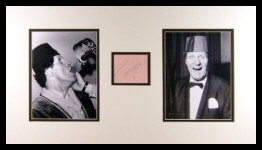
Tommy Cooper
Digger: What are your plans for Autograph Collection?
Steve: My plans are to be Internet-based and do one or two specialist
fairs. Iíve got no absolutely no plans to open a retail outlet.
Madness these days! If you open up a shop, youíre trapped and tied
to it. Thatís true of the Internet too to an extent, like when you spoke to me
the other day and I had just come back from a 200 mile visit to
Devon for a weekend break and then had to pack up all the Internet orders because I am
committed to getting them out as quickly as possible. The website
maintenance does take time and effort because itís important to
keep it up-to-date and fresh. But it's certainly worth it.
Digger: Steve, thatís been great. Thanks for letting us know so much
about the autograph world and your business.
Steve: Thanks David It was good.
Autograph Collection
have set up a discount code for users of retrosellers.com.
Simply enter the code RETRO when prompted during the checkout
process to receive 10% discount on any purchase. This offer
expires on 31/12/2010.
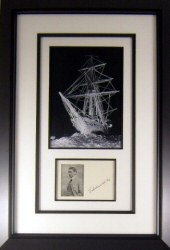
Ernest Shackleton
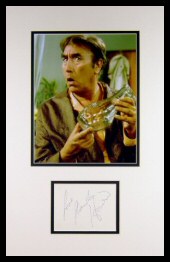
Frankie Howerd
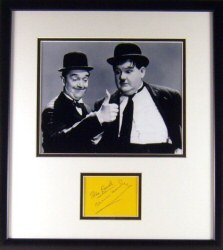
Laurel and Hardy
Autographs, signed photos
and autograph memorabilia for sale at the Autograph
Collection.
One of the UK's leading dealers in authentic movie
autographs, sports memorabilia and music memorabilia, the
Autograph Collection offers a broad range of signed
memorabilia including comedy autographs, football
memorabilia, historical autographs and space memorabilia.
New stock arrivals are listed daily. Every piece of signed
memorabilia has been carefully sourced from only the most
reputable of autograph dealers/auction houses and each is
sold with a Certificate Of Authenticity and a full money
back guarantee of authenticity.
Autograph Collection is Registered Dealer 302 with the
UACC (Universal Autograph Collectors Club) and Approved
Dealer 044 with AFTAL (Autograph Fair Trade Association
Ltd)
Steve Warner:
Email: autographsales@aol.com
Telephone Orders/Queries: 07919 092991 or 01686
671021
Autograph Collection
have set up a discount code for users of retrosellers.com.
Simply enter the code RETRO when prompted during the checkout
process to receive 10% discount on any purchase. This offer
expires on 31/12/2010.
|